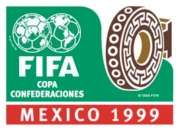Tournament Overview

The FIFA Confederations Cup of 1999 represented what was probably one of the lowest points in the history of German football during the postwar era. What happened in Mexico went beyond the disappointment in the World Cup the previous year, with the standard of the perfomances ranging from ordinary and sterile to diabolical.
If any sort of excuse could be offered for both the squad and Nationaltrainer Erich Ribbeck, it would most probably by tied to the fact that the tournament took place at the height of summer during a period when many top flight players would have preferred to be on holiday charging up their batteries for the coming season. Having just completed a long and busy schedule – particularly the Bayern München players who had made the final of the Champions’ League.
Quite simply, the prospect of spending the best part of two weeks playing in the blazing Mexican heat in what was perceived by many to be a mickey mouse invitational tournament against the likes of the United States and New Zealand was never going to be the most attractive draw – even if the first fixture threw up a meeting with Brazil.
Given the inconvenient timing of the event, the reluctance of the Bundesliga clubs to release their personnel and the general lack of interest Ribbeck found himself wedged between the proverbial rock and a hard place: he probably wished the entire thing could have been avoided altogether, but a decision not to participate in the tournament for the second time in a row – the DFB had declined the invitation to Saudi Arabia in 1997 – could very easily have put the German association in FIFA’s bad books and scuppered their application to host the World Cup in 2006.
In the end, the Nationaltrainer managed to cobble together a squad that could best be described as a mix of old timers and journeymen, supplemented by a small number of younger players who hadn’t really been tested in the international arena. The squad included names such as Arminia Bielefeld’s Ronald Maul, Hertha BSC’s Michael Preetz, 1. FC Nürnberg’s Heiko Gerber and the shortest-even centre forward in 1860 München’s Horst Heldt; both Maul and Gerber made their debuts during this Mexican fiasco, and would never be seen in the Schwarz und Weiß again.
Shoring up the defence was the again-recalled veteran Lothar Matthäus, whose attempt to fill the boots of such legends as Franz Beckenbauer and Matthias Sammer in the libero position was nothing short of ridiculous; time and again his lack of pace was exposed by even the most ordinary opposition, yet the coach for some reason or another persisted. Ribbeck had always been known as a rather intransigent individual who dug his heels in when faced with media criticism, and during his two-year spell in charge of the national side things were no different.
The ageing squad Ribbeck had inherited from his predecessor Berti Vogts was in the main left untouched and undeveloped, supplemented only by a number of players who were quite simply not fit to wear the Schwarze Adler. One of the worst cases was the Brazilian expat Paulo Rink, who has to qualify as the most ineffective striker who ever got to wear the Schwarz und Weiß – thirteen games with a zero return, and as one-footed as a paralytic flamingo.
This Ersatz-Mannschaft was eliminated from the tournament in the group phase, returning home with one win – a tedious and arguably flattering 2-0 result against minnows New Zealand; the other two games produced zero points and a goal difference of minus six.
If the Ribbeck era was the worst period in the postwar history of German football, the 1999 Confederations Cup was one of the lowest points. When one looks at these performances again is hard to believe that things could get any worse, but this is exactly what happened the following year at Euro 2000.
Tournament Matches
v Brazil First Phase Group B, Guadalajara, 24.07.1999 View Report »
v New Zealand First Phase Group B, Guadalajara, 28.07.1999 View Report »
v United States, First Phase Group B, Guadalajara, 30.07.1999 View Report »
